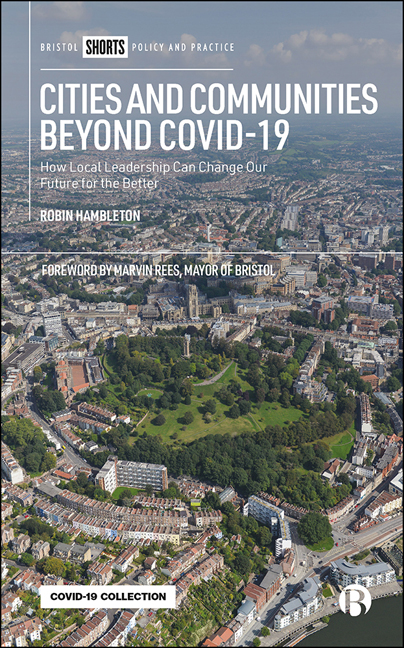Book contents
- Frontmatter
- Contents
- Lists of Figures, Tables and ‘Innovation Cameos’
- About the Author
- Acknowledgements
- Foreword
- One No Going Back
- Two The COVID-19 Pandemic
- Three The Central Challenge: Improving Governance
- Four The New Civic Leadership
- Five The Bristol One City Approach
- Six Enhancing the International Conversation
- Seven Lesson Drawing for the Future
- Index
Foreword
Published online by Cambridge University Press: 12 March 2021
- Frontmatter
- Contents
- Lists of Figures, Tables and ‘Innovation Cameos’
- About the Author
- Acknowledgements
- Foreword
- One No Going Back
- Two The COVID-19 Pandemic
- Three The Central Challenge: Improving Governance
- Four The New Civic Leadership
- Five The Bristol One City Approach
- Six Enhancing the International Conversation
- Seven Lesson Drawing for the Future
- Index
Summary
Robin Hambleton inducted me into the understanding that the political challenge we face today is not down to a shortage in the supply of clever people coming up with new policy ideas. We have plenty of ideas. The political challenge we face today is also about the structure, machinery and tradition of our model of governance.
It's a model that systematically withholds power from towns and cities across the United Kingdom and concentrates it in Whitehall and Westminster. In doing so, it undermines the leadership of people who must live with the consequences of the decisions of central government politicans, and puts it into the hands of place-less power, people and organizations, who have no real grounding and no connection to the places about which they are making decisions.
The challenge of being a directly elected mayor, trying to deliver for the people of Bristol who elected me, but with so many of the powers and resources I need being controlled by distant offices and people, has been a source of immense frustration. It undermines our ability to be a dependable partner to other organizations in the city, undermines our ability to plan, and undermines our ability to flex our local understanding of challenges and opportunities and then act with the speed and innovation they require.
This is a story repeated by mayors and local authority leaders across the UK and around the world, as evidenced in the proliferation of national and international city networks. There is a growing recognition that on local issues, such as housing delivery and transport solutions, to global issues such as climate change and migration, the current model just isn't delivering. Its distance and turgidity create a high risk of putting out ideas that are bright but locally inappropriate, while blocking new sources of insight.
It's in this context that the COVID-19 pandemic, as Robin points out, presents us with an opportunity. The virus, the lockdown and the economic depression have been testing all our systems – from education, food and public transport to criminal justice, electoral politics (our local elections were deferred from May 2020 to May 2021) and our plans to tackle climate change.
- Type
- Chapter
- Information
- Cities and Communities Beyond COVID-19How Local Leadership Can Change Our Future for the Better, pp. vii - viiiPublisher: Bristol University PressPrint publication year: 2020
- 1
- Cited by

